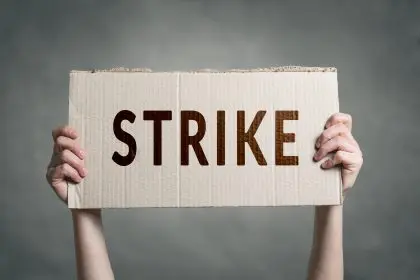
“Good morning, young kings!” This is the typical way students are addressed at Ron Brown College Preparatory (RBCP), Washington, D.C.’s new boys-only public high school. One of only a handful of its kind nationwide, the school is a little over a month into its inaugural school year. Yesterday, it received a visit from college students who have embraced the same all-boys model.
“I introduced you to my Morehouse brothers, so we’re family now,” said Morehouse Student Government Association president Johnathan Hill to the younger students. “You’re our little brothers.”
While on their trip to observe the opening of the new Smithsonian National Museum of African American History and Culture, a group of Morehouse College students paid the new school a visit Friday.
“The Men of Morehouse College visited the Young Kings at Ron Brown High School today. They brought stories, poems, and images of greatness with them,” read a statement posted by school psychologist Charles Curtis.
Calling students “young kings,” according to principal Benjamin Williams, is a way to build “self-confidence and positive reflection” in students each time they look in a mirror.
“Generally speaking, in their environments, they are degraded,” he told USA Today last month. “They are put down. When they look on media, sometimes they don’t always see the most positive representations of young men of color.”
Curtis was a bit more direct, his words bluntly highlighting why a visit by their “big brothers” from Morehouse has such a positive impact.
“So often, young men of color, their experience in education is an expectation of criminology, an expectation of pathology, an expectation of dysfunction, even if it’s not overt,” Curtis said. That expectation “plays out in the services that they get. It plays out in their discipline referrals. It plays out in the expectations of their classroom teacher. And I think here we are, on purpose, naming high expectations.”
The school’s philosophy all but prohibits out-of-school suspensions and focuses instead on restorative justice, which offers victims the opportunity to confront their tormentors face-to-face. Students who fight must come together in a circle and talk openly about how the conflict affected them. Bystanders are also expected to take part, naming names of students who had been involved, since they’re affected, too.
“We want to say their names now, while they are alive, while they are young men, in order for them to be great,” said Curtis. “So if you make some mistake, if there is harm in the community, I’m going to say your name now so you can own it and you can fix it and you can come back.”
It is a philosophy that is acknowledged to be radical but also required, given the radical problems students face. Single-sex schools have been growing in number over the past five years, said Leonard Sax, author of Boys Adrift, which examines the current crisis affecting boys and young men. Curtis likens the school’s efforts to those who attempt to save particular endangered species from extinction – a humbling task for which he sees the inspiration from the Morehouse Men as a welcome influence.

“They pulled at the greatness of the Young Kings and encouraged them to see the example of greatness they were presenting,” said Curtis. “The power of forty, college age Black Men telling you that you are a God is what our Young Kings felt today. My head is bowed at the greatness I am charged with serving.”





